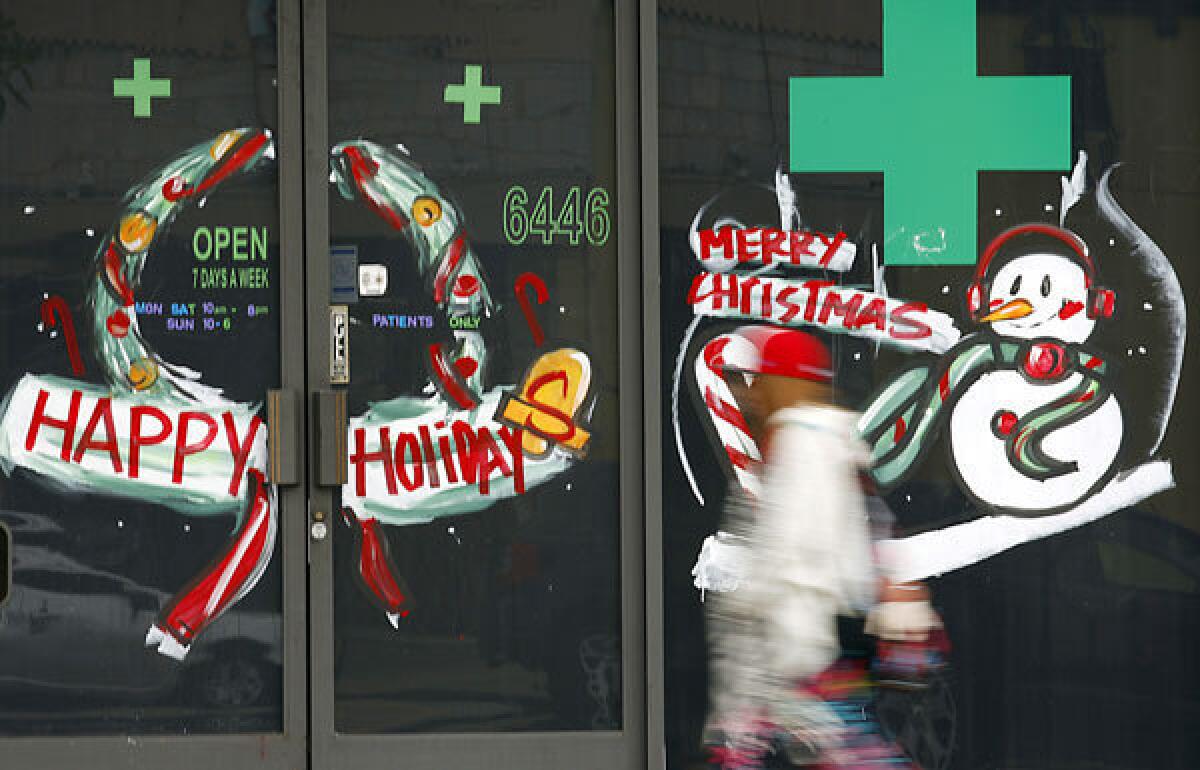L.A. voters could decide 3 pot measures on May ballot

- Share via
Even in the complicated world of pot politics, it’s a confusing prospect: In the May municipal election, Los Angeles voters could face not one but three ballot measures geared toward regulating medical marijuana dispensaries.
All three of the proposals would allow some pot shops to remain open, albeit under different regulations.
The first two measures, which are sponsored by two groups of medical marijuana activists with competing interests, qualified for the ballot last week. One would permit only those dispensaries that opened before a city moratorium in 2007. The other would allow any pot shop that meets certain requirements to operate and would raise taxes on medical marijuana sales by 20% to pay for city enforcement.
Neither of those options appeals to the City Council, which has struggled for years to regulate medical cannabis against a backdrop of ever-shifting case law and increasing pressure from federal drug enforcement officials. City Council President Herb Wesson said Monday that neither of the existing ballot measure proposals would “accomplish the goal of limiting the proliferation of medical marijuana dispensaries while providing adequate protections for our neighborhoods.”
He and his colleagues decided to propose a ballot measure of their own. The council will vote Wednesday on whether to present it to voters in May.
The language of the new proposal is still being worked out, but it will probably require dispensaries to be at least 1,000 feet apart, according to Chris Koontz, who has worked on the issue as an aide to Councilman Paul Koretz. It will also include an increase of the medical marijuana tax.
Koontz acknowledged that voters might be confused by having to choose from three ballot measures with only slight differences. “I cannot believe this is how policy is made,” he said. But he said the council passing its own law was a less viable option. It was unclear whether a previous Koretz proposal to allow only the pre-moratorium shops to stay open had the political will to clear the council, Koontz said, and even if the law had been approved, it might be invalidated in May if voters approve one of the other medical marijuana measures.
A supporter of one of those measures dismissed the council’s action as “a political play.”
David Welch, an attorney who is pushing for the measure that would allow any shop that meets certain requirements to operate, said the council should make laws “instead of punting the issue to the voters.” Welch said he had not yet seen the details of the new proposal.
Neither had Yami Bolanos, the president of the Greater Los Angeles Collective Alliance, which is backing the competing proposal that would allow only the pre-moratorium dispensaries. She said she was also frustrated by the council, which she said has chosen not to work with the medical marijuana community.
“I’m kind of in disbelief,” she said.
But Bolanos held open the possibility that her coalition, which includes a labor union that represents dispensary workers, might come around to support the council-backed proposal. After all, the council’s law would allow older dispensaries like the ones she represents to stay open, although they would have to follow the 1,000-foot distance requirements.
“I can’t tell you whether I would abandon my initiative to go to that one,” Bolanos said. “But if that’s what it takes, that’s what it takes.”
More to Read
Sign up for Essential California
The most important California stories and recommendations in your inbox every morning.
You may occasionally receive promotional content from the Los Angeles Times.











